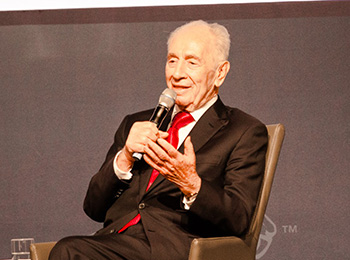TORONTO — “For the sake of our children – all of us – Iran should not become a nuclear power.”
So said former Israeli president and prime minister Shimon Peres at this month’s Toronto Global Forum.
The Toronto forum is held under the auspices of the International Economic Forum of the Americas (IEFA), whose annual summits draw thousands of central bank governors, ministers, business leaders and global economic decision-makers.
Addressing a lunch-hour session of about 700 at the Fairmont Royal York hotel on July 9, the 92-year-old Israeli statesman sounded several notes of optimism about Middle East peace, Islamic terrorism and even Iran.
Interviewed on stage by David Shuster, an anchor for Al Jazeera America, prior to the July 14 Iran deal announcement,&Peres said he’s opposed to allowing Iran to obtain nuclear weapons, but he relented when asked if certain conditions were met.
If, for example, Iran agrees to inspections of all weapons sites, including military ones, and other oversight, Peres would support a deal.
“What’s the alternative?” asked an alert and relaxed Peres, who served as Israel’s prime minister from 1984 to 1986, again from 1995 to 1996, and as president from 2007 to 2014.
“If you bomb [nuclear] installations, then what are you going to do? You have to inspect again. And nobody wants to remain there. If the Iranians meet the necessary conditions to verify and inspect, yes [he would agree to a deal].”
Peres good-naturedly ducked a question about the U.S. presidential race and whether Democratic frontrunner Hillary Clinton would be a better friend to Israel than President Barack Obama.
“Well, you want me to participate in American elections? I didn’t come for that,” Peres said to laughter. “I know Hillary. She’s a wonderful lady, but I don’t believe she would expect me to make any remarks concerning the elections.”
Peres had warm words for Obama.
“In my judgment, you should judge a president in accordance with the record – what he did, not just trying to analyze it psychologically. Look at the record of Obama. On Israel, everything we asked for in the domain of security, the answer was yes. And everything we asked [for] in the domain of politics, again a positive answer – on some points, against his own [personal] position.”
Peres said he believes the fight against the Islamic State (ISIS) “is basically an Arab problem. What I would recommend is that United Nations charge the Arab League [with taking] over the fight. They have soldiers, weapons, money. They are the ones who can understand what is going on.”
Islamic terror, a relatively new problem in the Middle East, is rooted in “poverty, ignorance and historic mistakes,” he said.
The region was created by colonial empires for “their own convenience. The vast empires, the French and British, built the Middle East [so] that both sides should be satisfied. They didn’t pay attention to the local people. So they constructed nations that are not coherent, from different tribes. And they made borders, again without paying attention to the past or the ethnicity of the people. Once the empires lost their control, every country almost went back to the beginning and found they were not the same people.”
Thus, today’s Syria and Iraq are “lost empires.”
Meantime, young Muslims are drawn to extremism as the result of a simple message: “Cut [off] the head and save the world. People take it as very simple. I really wonder why they listen more to this very simplistic and brutal [message] and not more to their own religious leaders.” However, Muslim religious leaders “are beginning to mobilize.”
He said the West should be targeting young Muslims. Of the region’s 400 million Arabs, 60 per cent are under the age of 25, Peres noted.
“I think they should be our audience. I think the old generation, unfortunately, is a lost generation.”
Peres recalled Obama once asking him, “Who is against democracy in the Middle East?”
“I told him ‘the husbands.’ In the name of Allah, they don’t give equal rights to women. If you don’t give equal rights to women, you are half a nation.”
Peres still hopes for a two-state solution, “a Palestinian state and an Israeli state living in peace and respect and cooperation.” He pointed to Canada, which has tensions with Quebec, “but you found a solution.”
His only note of pessimism came when Gaza was brought up.
Gaza is “a disappointment, to tell you the truth. We didn’t expect, and it’s still hard to understand why, once we left Gaza, [Palestinians] started to shoot at us, at our mothers and children. What for? [They couldn’t] say they were against occupation because the occupation was ended.
“Terrorists are not based on reason. They are based on lack of reason. And I hope that change in Gaza will come, and with it, [change for other] Arabs as well. They begin to understand that if they shoot at us, they will get it back.”
As for advice, Peres counselled forgetting the past and dreaming big.
“Remember the future, not the past. The past is over. You can’t correct it. The idea that you have to learn from history in order not to repeat same mistakes is a little bit shallow [because you] can still make new mistakes. Why is the new mistake better than the old mistake?”
Peres said his dreams from long ago “were surprising at the time. Today when I look at them, they were too small. So I recommend [that you] have great dreams, not small dreams.”
